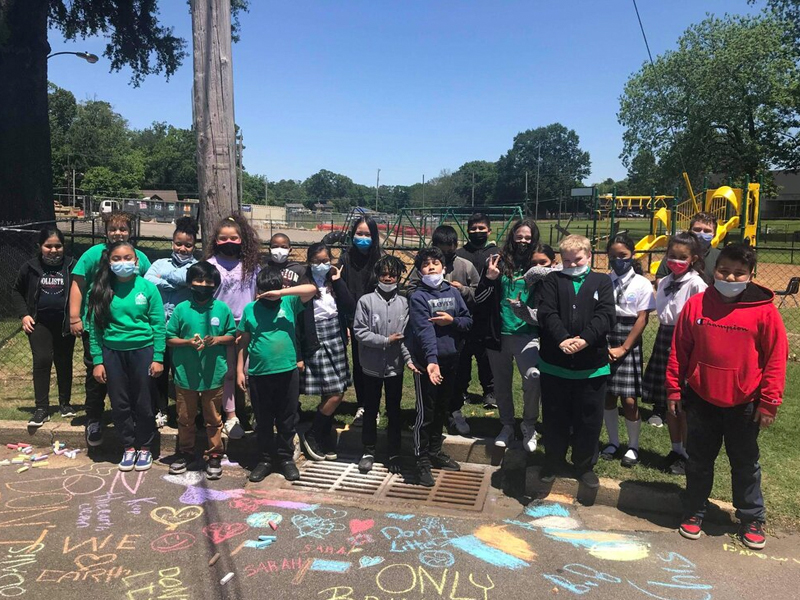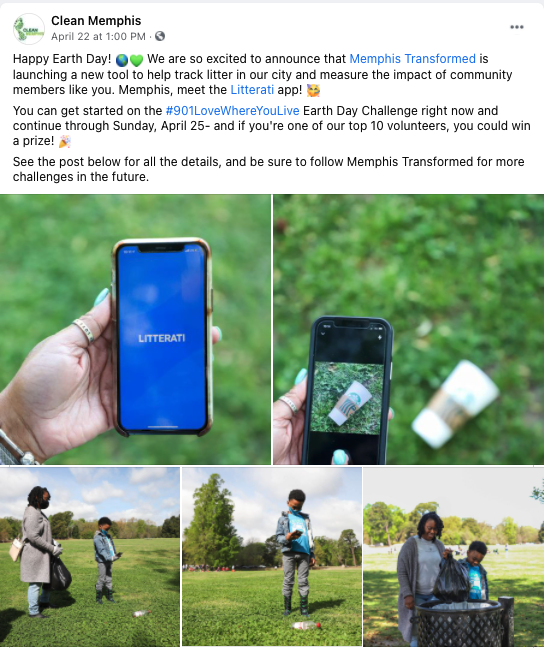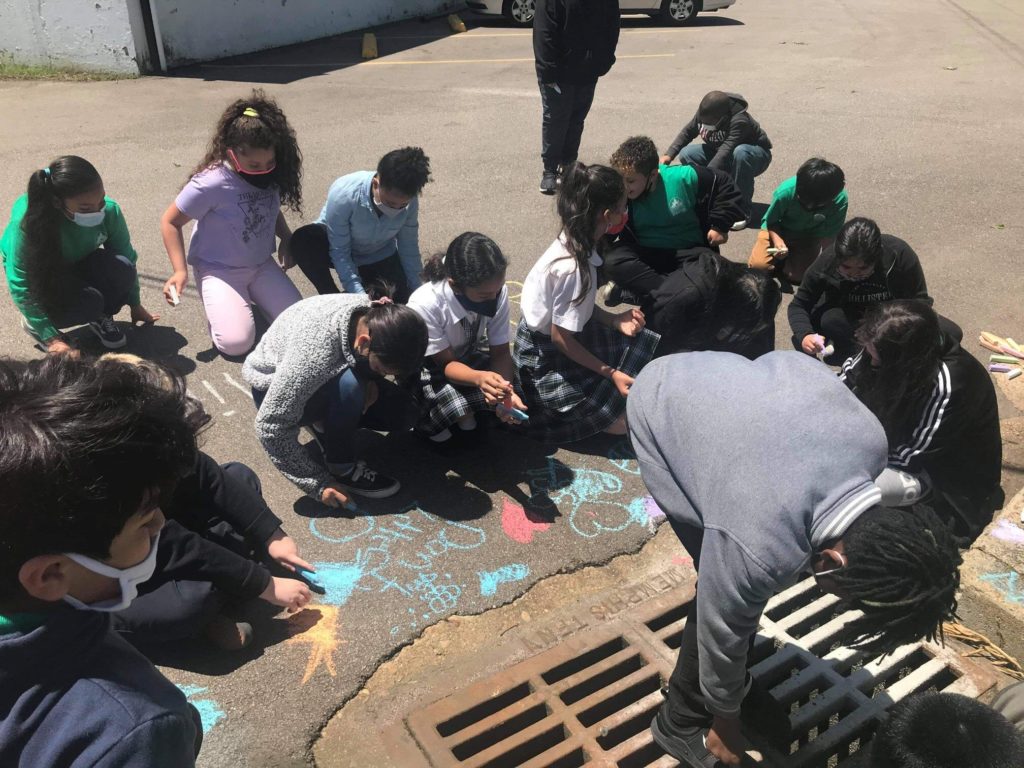
Michelle Cowan leads Clean Memphis’ Educational programs and wants all Memphis area teachers to be as equipped as possible to teach about sustainability and the environment. Take a peek at our interview with her to see how you might implement some concepts and material into your lessons!
Q1 - How does Clean Memphis seek to educate Memphis students about the environment and sustainability?
Clean Memphis uses its knowledge of sustainability to develop lessons that link grade-level standards to the science of the world around us. For example, to teach 2nd graders about water conservation, we read age-appropriate books with environmental content, then bring that lesson home to the student with engaging activities they participate in to open their eyes to the world around them. We make it clear to students that they are the future of our environment and it takes knowledge to know how to take care of it. Water is a natural resource, and though it is limited, it is also true that the Earth is 75% water, so it may appear abundant to students. Clean Memphis helps to bridge that gap and make sure students understand that only 1% of the water on Earth is available freshwater for drinking.
In middle school grades when science focuses on chemistry and physics we educate students about the physical and chemical changes that occur in our environment that have an effect on our environment. We use real data to track climate change, we innovate about inventions to collect trash from the ocean. Students learn about sustainable energy by putting together models and testing out their capabilities themselves. We teach the facts, not the hype about sustainability: we must all do our parts to use as little of our limited natural resources as we can each year to allow them to last longer into the future.
Q2 - How would a Memphis educator who is passionate about sustainability access the braintrust and resources of Clean Memphis?
Each year, Clean Memphis takes requests from schools and teachers in SCS and SCS Charter schools for in-class programming. We are happy to work with a teacher to facilitate Clean Memphis as a visiting educator on a one-time basis for a single class, a unit, or as a regular guest teacher. We can work with you to incorporate our lessons into your curriculum. We follow TN Grade level Scope and Sequence, though we are flexible enough to either teach an intro lesson or be there during review.
In addition, Clean Memphis can facilitate quarterly interdisciplinary Project Based Learning on subjects such as Zero Waste and the Circular Economy, Food Waste, Solid Waste and Litter, or Water. These would involve a combination of in-class programming as well as support from the teacher to implement the projects. Projects are interdisciplinary with research, data collection, analysis and presentation of data, as well as designing solutions to environmental issues.
Q3 - Say someone is not a science teacher, can their classroom still benefit from Clean Memphis?
Yes! ELA also lends itself to environmental messaging. Clean Memphis has found great children’s books that allow us to share hopeful messaging about every person’s contribution to keeping our Earth clean. We are happy to share our recommended book lists for various grade levels.
Math is, of course, another way to incorporate Environmental Science. Clean Memphis has resources where firsthand data can be found related to greenhouse gases, and how students can collect air quality data, litter data, all kinds of environmental on their own, for free! Once a teacher sees students engage over the gathering of firsthand data that affects their lives, there is no limit to their use of the data in their classroom. High school and older middle school students might enjoy gathering their own data from apps such as Litterati. The Litterati app is licensed by Clean Memphis to gather data in the City of Memphis about the amount and type of litter in geographic areas to help inform the City’s management in keeping our City clean. Students and teachers can help this research project by participating – picking up and recording litter around their schools or community. Data is available to analyze according to your academic needs.
Subjects like geography lend themselves to lessons about Watersheds and pollution, and the sustainability of natural resources. Social Studies, depending on the era, can discuss the factors that led to the Dust Bowl and its long-term environmental effects. The history of Memphis can also focus on environmental health and the structural changes the City had to make after the Yellow Fever epidemic.


Q4 - Do you have any stories about students who have made an impact in their communities or for their schools based on your sustainability education?
Yes! This year, Clean Memphis introduced students in 3rd, 4th and 5th grades to the concept of Environmental Service: students participated in quarterly challenges that involved learning about and providing a service to the environment. Our 3rd Quarter Litter Challenge was a research study to closely examine the makeup of the litter on our streets and in our parks. Students together picked up over 2500 pieces of litter, with 80% of the litter related to eating or drinking, and most of that being single-use plastic. One student went to her local park with her family and picked up over 200 pieces of trash–every piece of trash in that park that day! Students felt pride over picking up litter, with most students who participated picking up more than the required amount.
One entire elementary school has made the move to encourage their scholars to use reusable water bottles as a school wide effort to have less plastic waste. To support that effort, Clean Memphis provided reusable water bottles to all the scholars that we teach at that school this year. The school has tracked the number of water bottles used this current year and will be working to beat that goal as they continue to track their consumption. In addition, a group of high school students worked with teachers to develop a rain garden on their campus to reduce the runoff from their campus roofs and to capture this water and filter it before the water returns to the groundwater. Impacts like these are student-led and long-term; they are becoming part of the culture of the school, which is the way toward long-term change.
Q5 - Can Clean Memphis partnership help provide professional development hours for educators?
Yes! Clean Memphis works with school administrators to provide ongoing Professional Development related to its work throughout the year on a demand basis. Recent professional development sessions covered several project-based learning initiatives, such as our Litter Challenge Research Project, or our Home Food Waste Audit, and the use of new engagement tools to increase students’ participation while focusing on the standards in a more hands-on way, such as our advanced water cycle and carbon cycle that has students represent each form of water or carbon as they travel from one location/form to another. We show teachers how to make the science more real to students by showing the interconnections between environmental science and students’ lives in ways that may not be obvious.
If you’re interested in having Clean Memphis get involved with your classroom, reach out to Michelle directly and keep an eye out for updates on the Clean Memphis website!
